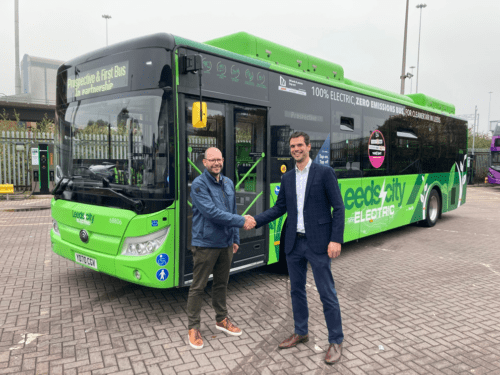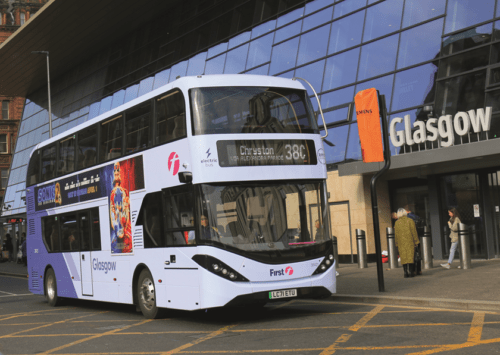
First Bus has announced what it says is a ‘groundbreaking’ partnership with an artificial intelligence (AI) technology firm to revolutionise services for its customers following a successful roll-out in West Yorkshire and the West of England.
It has formalised a new three-year partnership with Prospective.io, an AI company whose software can automatically generate optimal timetables, schedules and real time fleet instructions. The new deal represents an investment of at least £4.5m in the AI technology, with the intention of transforming its customer offering and encourage more people to travel by bus by enhancing the customer experience, improving punctuality and efficiency of its services across the UK.
First says the software will enable it to improve the reliability of timetables and shift patterns, using AI to predict traffic conditions and peak running times to help ensure services run on time. It will also allow full timetables to be created or adjusted and buses to be scheduled in minutes – a process that Prospective says would typically take days to complete.
The partners say that the new system will mean that local teams can be more agile with frequent, subtle changes to ensure timetables remain accurate throughout the year – all of which will assist First in its aims to improve its overall customer experience. First said that trials in a number of cities across the country, led to a significant enhancement in service reliability while simultaneously reducing fleet operating costs and emissions through efficiencies, and that passengers have experienced improved service quality with the punctuality of services on trial routes having jumped over 20% in many cases.
Additionally, Prospective says its software can be used to identify where bus priority interventions such as parking enforcement and restrictions, bus lanes, bus gates, priority signals and traffic removal would have the biggest impact on travel times, which can help local authorities prioritise where to target investments.
Chief Commercial Officer for First Bus Simon Pearson said: “We’re excited to roll out Prospective’s network planning and scheduling software across our UK bus operations and know that it will benefit both customers and colleagues alike. We are always working hard to bring our customers the best possible experience, ensuring that our buses are as efficient and punctual as possible.
“We’re not only looking to drive improvements for our existing customers, but to make bus an affordable, more reliable and attractive part of everyone’s everyday transport mix. The results we’ve achieved in West Yorkshire and the West of England have been incredible in such a short space of time, but we’re only scratching the surface of its potential. We’re excited to roll out this software and see the benefits it brings to our customers.”
CEO of Prospective Pete Ferguson said: “We’re delighted to be rolling out our platform across First Bus’ UK operations. The FlowOS platform will support the delivery of more reliable and convenient public transport services and help grow public transport use in the UK. First Bus has been central to the development of Prospective’s AI software for the public transport market – supporting us throughout the development, testing and refinement of software for bus service planning.
“We’re grateful for First Bus’ support, creativity and commitment to improving public transport across the UK and are proud of our growing partnership.”
Scottish experience
First Glasgow has already adopted the data-led approach using AI software to optimise its network, and says it has seen punctuality and reliability improve by 16% since it began to pilot the technology during August and September. Commercial Director for First Bus Scotland Graeme Macfarlan said: “We want to provide our customers with a service that is reliable, consistent and, most importantly, on time. With the increase in congestion in recent years throughout Glasgow, we understood the importance of building timetables that fit with the current live road conditions, so our customers know when their bus will arrive.
“The adjustments we are making to the timetables will achieve that while allowing us to maximise the effectiveness of the number of buses we have running in the city to serve as many people as possible. It also further highlights the need for local authority investment in bus priority measures to overcome issues which are outside the control of bus operators, such as congestion. By doing so, it will help provide a better, more efficient public transport service in the city.”


